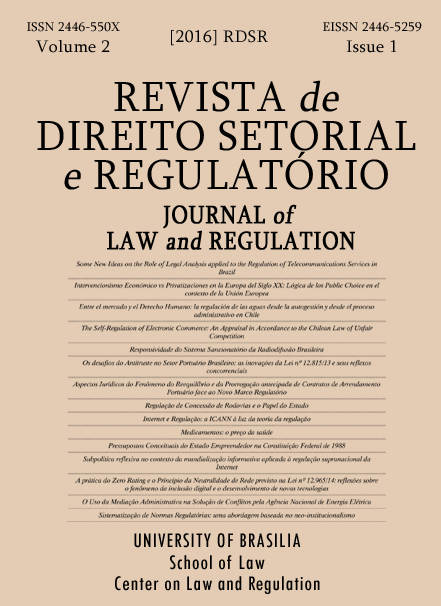Conceptual Underpinnings of the Entrepreneurial State in the Brazilian Constitution of 1988
Palabras clave:
Estado Empreendedor, regulação, política industrial, CT&I, sustentabilidadeResumen
Purpose ”“ This article points out the conceptual underpinnings of the Entrepreneurial State and identifies them in the Brazilian Constitution, in order to draw a theoretical framework for a juridical and critical assessment of industrial policy and science, technology and innovation development.
Methodology/approach/design ”“ The article deepens the building blocks of the concept of Entrepreneurial State introduced by Mariana Mazzucato (2014) and explores the Brazilian Constitution in order to identify the conceptual elements of this model of State.
Findings ”“ In this article, it is argued that the Brazilian Constitution has adopted the Entrepreneurial State model for the regulation of the science, technology and innovation sector and industrial policy, according to which policy related with these sectors must have state regulation with the objective to promote a sustainable national development.
Practical implications ”“ As the main practical consequences of the Entrepreneurial State model, it is proposed in this article that an entrepreneurial approach is counter to theories that support the removal of state regulation on markets, while it fosters the adoption of development policies that value a country’s local features.
Originality/value ”“ The article debates the Entrepreneurial State conceived as a dimension of the Regulatory State, especially as a framework of industrial and development policy on science, technology and innovation.
Referencias
ARBIX, G. Inovar ou Inovar. A indústria brasileira entre o passado e o presente. São Paulo: Papagaio, 2007.
ARBIX, G. et al (Orgs). Inovação: Estratégia de sete países. Série Cadernos da Indústria ABDI. v. XV, Brasília: Agência Brasileira de Desenvolvimento Industrial, 2010.
ARBIX, G.; VARON, J. Finlândia: O salto para uma economia baseada no conhecimento. In: ARBIX, G. et al (Orgs). Inovação: Estratégia de sete países. Série Cadernos da Indústria ABDI. v. XV, Brasília: Agência Brasileira de Desenvolvimento Industrial, 2010.
CASTRO, M. F. Novas perspectivas jurídicas sobre a reforma de políticas públicas no Brasil. Revista de Direito da Universidade de Brasília, v. 01, n. 01, p. 32-64, junho de 2014.
CHANG, H. The political economy of industrial policy in Korea. Cambridge Journal of Economics, n. 17, p. 131-157, 1993.
FREITAS, J. Sustentabilidade. Direito ao Futuro. 2ªed., Belo Horizonte: Fórum, 2012.
GRAU, E. R. A Ordem Econômica na Constituição de 1988. Interpretação e Crítica. 16ªed., São Paulo: Malheiros Editores, 2014.
HAYEK, F. A. The Use of Knowledge in Society. In: Individualism and Economic Order. Chicago: The University of Chicago Press, 1980.
HUNT, E. K. História do Pensamento Econômico: Uma perspectiva crítica. Rio de Janeiro: Elsevier, 2005.
KENNEDY, D. Some Caution about Property Rights as a Recipe for Economic Development. Accounting, Economics, and Law, v. 1, n. 1, 2011.
KNIGHT, F. Risco, Incerteza e Lucro. Rio de Janeiro: Expressão e Cultura, 1972.
LA PORTA, R. et al. Law and Finance. Journal of Political Economy, v. 106, n. 6, 1998.
MAZZUCATO, M. O Estado Empreendedor. Desmascarando o mito do setor público vs. setor privado. São Paulo: Portfolio Penguin, 2014.
MUSACCHIO, A.; LAZZARINI, S. G. Reinventando o Capitalismo de Estado. O Leviatã nos negócios: Brasil e outros países. São Paulo: Portfolio Penguin, 2015.
NORTH, D. Institutions, Institutional Change and Economic Performance. Cambridge: Cambridge University Press, 1991.
OCDE. Manual de Oslo. Proposta de Diretrizes para Coleta e Interpretação de Dados sobre Inovação Tecnológica. FINEP, 2004.
ORGANIZAÇÃO DAS NAÇÕES UNIDAS. Transformando Nosso Mundo. A Agenda 2030 para o Desenvolvimento Sustentável. 2015. Disponível em: http://nacoesunidas.org/wp-content/uploads/2015/10/agenda2030-pt-br.pdf. Acesso em: 20/11/2015.
POLANYI, K. A Grande Transformação. As origens de nossa época. 2.ed. Rio de Janeiro: Elsevier, 2012.
SCHAPIRO, M. G. Repensando a relação entre Estado, Direito e Desenvolvimento: os limites do paradigma Rule of Law e a relevância das alternativas institucionais. Revista Direito GV, São Paulo, jan-jun 2010.
SCHAPIRO, M. G.; TRUBEK, D. Redescobrindo o Direito e Desenvolvimento: experimentalismo, pragmatismo democrático e diálogo horizontal. In: SCHAPIRO, M. G.; TRUBEK, D. (orgs). Direito e Desenvolvimento. Um diálogo entre os BRICS. São Paulo: Saraiva, 2012.
SCHUMPETER, J. A. Capitalism, Socialism and Democracy. 3ªed., New York: Harper Perennial Modern Thought, 2008.
TEIXEIRA, N. O Mercado de Capitais Brasileiro à Luz de seus Avanços e Desafios. In: BACHA, E. L; OLIVEIRA FILHO, L. C. (orgs.). Mercado de Capitais e Crescimento Econômico, Rio de Janeiro / São Paulo: Contracapa Livraria / Anbid, 2007.
WALDO, D. The Administrative State. A Study of the Political Theory of American Public Administration. New Brunswick (USA): Transaction Publishers, 2007.
WILSON, E. J. The Information Revolution and Developing Countries. Cambridge, Massachusetts: The MIT Press, 2006.
WORLD BANK GROUP. About Doing Business. Disponível em: www.doingbusiness.org/about-us. Acesso em: 20/11/2015.
Descargas
Publicado
Número
Sección
Licencia
Al enviar este documento a la Revista de Derecho, Estado y Telecomunicaciones, declaro que estoy aceptando los términos de Creative Commons Attribution 4.0 International (CC BY 4.0), disponible en http://creativecommons.org/licenses/by/4.0.


